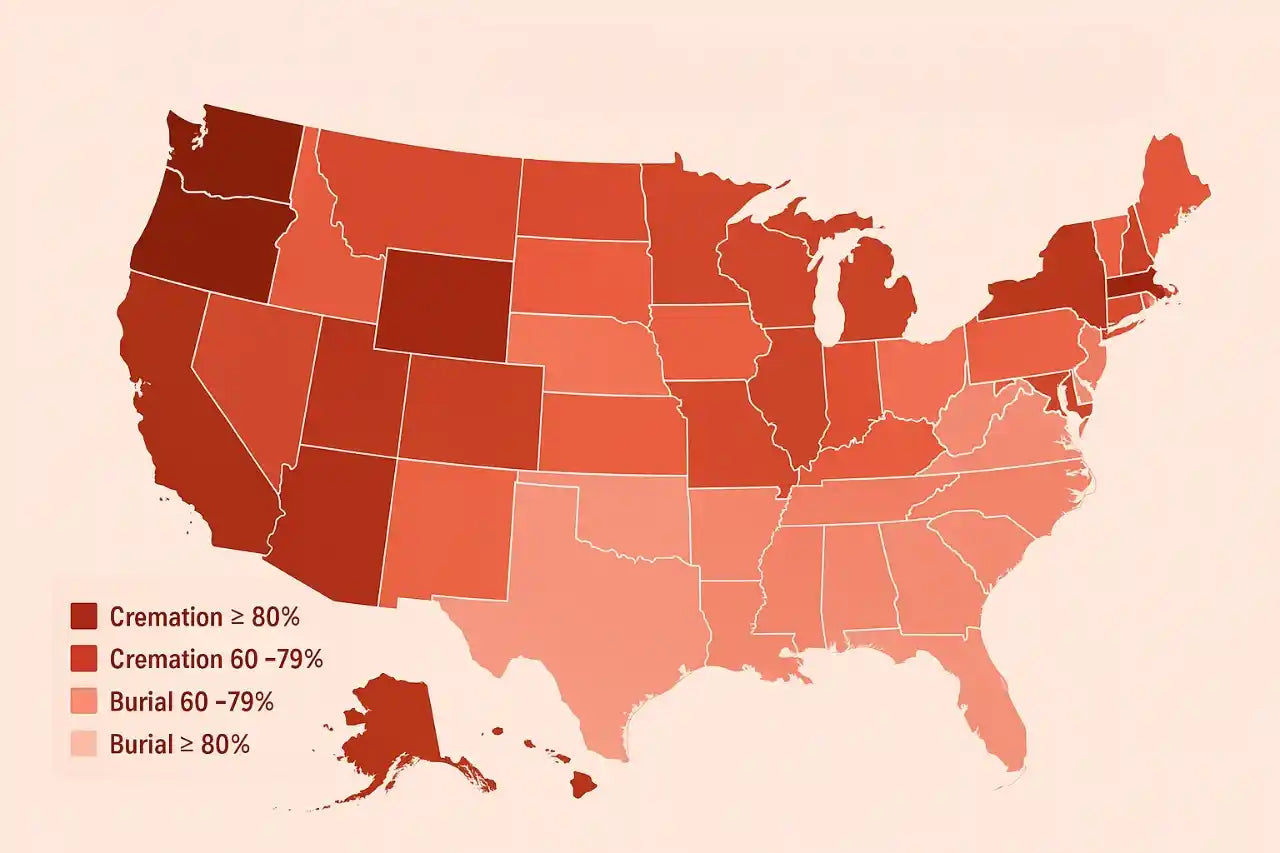Advance Directive
- Phonetic Pronunciation: /ədˈvæns dəˈrɛktɪv/
- Definition: A legal document that outlines a person's wishes regarding medical treatment if they are no longer able to communicate.
- Etymology: The term combines "advance" (from Latin "advantia," meaning "forward") and "directive" (from Latin "directivus," meaning "to guide or manage").
Burial
- Phonetic Pronunciation: /ˈbɛriəl/
- Definition: The act of placing a deceased person into the ground.
- Etymology: Derived from the Old English "byrgan," meaning "to conceal or protect".
Burial Plot
- Phonetic Pronunciation: /ˈbɛriəl plɑt/
- Definition: A designated piece of land in a cemetery for burying the deceased.
- Etymology: "Plot" from Old English "plot," meaning "a small piece of ground".
Burial Vault (Casket Vault)
- Phonetic Pronunciation: /ˈbɛriəl vɔlt/
- Definition: A lined and sealed outer container that houses the casket in the ground.
- Etymology: "Vault" originates from Latin "volutus," meaning "to turn or roll".
Casket
- Phonetic Pronunciation: /ˈkæskɪt/
- Definition: A container in which a deceased person is buried. See also "Coffins"
- Etymology: From the Old French "cassette," a diminutive of "casse," meaning "box".
Cemetery
- Phonetic Pronunciation: /ˈsɛmɪˌtɛri/
- Definition: A place where the dead are buried.
- Etymology: From Greek "koimeterion," meaning "sleeping place".
Coffin
- Phonetic Pronunciation: /ˈkɒfɪn/
- Definition: A container for a deceased person, typically more anthropoid in shape compared to a casket. See also "Casket"
- Etymology: From Old French "cofin," meaning "basket".
Columbarium
- Phonetic Pronunciation: /ˌkɒləmˈbɛəriəm/
- Definition: A building with niches for storing urns containing cremated remains.
- Etymology: From Latin "columba," meaning "dove," as these structures were originally dovecotes.
Condolence
- Phonetic Pronunciation: /kənˈdoʊləns/
- Definition: Express sympathy for the loss of a loved one.
- Etymology: "Condolence" from Latin "condolere," meaning "to suffer together"
- Variations:
- Condolence Gift
- Condolence Flowers
Cremation
- Phonetic Pronunciation: /kriːˈmeɪʃən/
- Definition: The process of burning a deceased body into ashes.
- Etymology: From Latin "cremare," meaning "to burn".
Cremation Garden (Scattering Garden)
- Phonetic Pronunciation: /kriːˈmeɪʃən ˈɡɑrdən/
- Definition: A designated area in a cemetery where cremated remains can be scattered.
- Etymology: "Garden" from Old Norse "gardr," meaning "enclosure".
Cremation Urn
- Phonetic Pronunciation: /kriːˈmeɪʃən ɜrn/
- Definition: A container used to hold cremated remains.
- Etymology: See "Cremation" and "Urn".
Crypt
- Phonetic Pronunciation: /krɪpt/
- Definition: An underground room or vault beneath a church, used as a burial place.
- Etymology: From Greek "kryptos," meaning "hidden".
Direct Cremation
- Phonetic Pronunciation: /dəˈrɛkt kriˈmeɪʃən/
- Definition: A cremation process without a preceding funeral service.
- Etymology: See "Cremation".
Double-Depth Burial Plot
- Phonetic Pronunciation: /ˈdʌbəl dɛpθ ˈbɛriəl plɑt/
- Definition: A burial plot where two caskets are buried one above the other.
- Etymology: "Double" from Latin "duplus," meaning "twofold".
Embalming
- Phonetic Pronunciation: /ɛmˈbɑːmɪŋ/
- Definition: The process of preserving a deceased body using chemicals.
- Etymology: From Middle French "embaumer," meaning "to put balm around".
Eulogy
- Phonetic Pronunciation: /ˈjuːlədʒi/
- Definition: A speech given at a funeral in praise of the deceased.
- Etymology: From Greek "eulogia," meaning "praise".
Exhumation
- Phonetic Pronunciation: /ˌɛkshjuːˈmeɪʃən/
- Definition: The act of digging up a buried body.
- Etymology: From Latin "exhumare," meaning "to remove from the ground".
Family Plot
- Phonetic Pronunciation: /ˈfæmɪli plɑt/
- Definition: A section of a cemetery reserved for members of the same family.
- Etymology: "Plot" from Old English "plot," meaning "a small piece of ground".
Flat Headstone
- Phonetic Pronunciation: /flæt ˈhɛdstəʊn/
- Definition: A grave marker that lies flat on the ground.
- Etymology: "Headstone" from Old English "heafodstán," meaning "stone at the head of a grave".
Flower Spray
- Phonetic Pronunciation: /ˈflaʊər spreɪ/
- Definition: An arrangement of flowers used for funerals or memorial services, typically laid on top of the casket.
- Etymology: "Spray" from Old English "spræg," meaning "a small branch".
Funeral
- Phonetic Pronunciation: /ˈfjʊnərəl/
- Definition: A ceremony honoring and remembering a deceased person.
- Etymology: From Latin "funus," meaning "funeral rites".
Funeral Flowers (Burial Flowers)
- Phonetic Pronunciation: /ˈfjʊnərəl ˈflaʊərz/
- Definition: Flowers used in a funeral service to honor the deceased.
- Etymology: "Flower" from Old French "flor," meaning "blossom".
Funeral Music
- Phonetic Pronunciation: /ˈfjʊnərəl ˈmjuːzɪk/
- Definition: Music played during a funeral ceremony.
- Etymology: "Music" from Greek "mousike," meaning "art of the Muses".
Funeral Planning
- Phonetic Pronunciation: /ˈfjʊnərəl ˈplænɪŋ/
- Definition: The process of arranging a funeral.
- Etymology: "Planning" from Latin "planus," meaning "flat" or "level".
- Phonetic Pronunciation: /ˈfjʊnərəl dəˈrɛktər/
- Definition: A professional who manages funeral services and provides support to the bereaved.
- Etymology: "Director" from Latin "dirigere," meaning "to guide".
Funeral Home
- Phonetic Pronunciation: /ˈfjʊnərəl hoʊm/
- Definition: A facility where a body is prepared for funeral and disposition, and where the body can be viewed by friends and family.
- Etymology: "Home" from Old English "ham," meaning "dwelling".
- Phonetic Pronunciation: /ɡreɪv/
- Definition: A hole dug in the ground for the burial of a deceased person.
- Etymology: From Old English "græf," meaning "a trench or ditch".
Grave Marker
- Phonetic Pronunciation: /ɡreɪv ˈmɑrkər/
- Definition: A stone or plaque that marks a grave.
- Etymology: "Marker" from Old English "mearc," meaning "boundary or sign".
Green Burial
- Phonetic Pronunciation: /ɡrin ˈbɛriəl/
- Definition: A burial process that uses no chemicals, casket, or burial vault, and is carried out in a cemetery that uses no artificial pesticides.
- Etymology: "Green" from Old English "grene," meaning "to grow".
Hearse
- Phonetic Pronunciation: /hɜrs/
- Definition: A vehicle for transporting the casket during a funeral.
- Etymology: From Middle English "herse," meaning "a framework for candles".
Headstone
- Phonetic Pronunciation: /ˈhɛdstəʊn/
- Definition: An upright marker placed at the head of a grave. See Signature Headstones
- Etymology: Combination of "head" and "stone".
Interment
- Phonetic Pronunciation: /ɪnˈtɜrmənt/
- Definition: The act of burying a body in a grave.
- Etymology: From Medieval Latin "intermentum," meaning "to place in the earth".
Inurnment
- Phonetic Pronunciation: /ɪnˈɜrnmənt/
- Definition: The placement of cremated remains into an urn.
- Etymology: "In-" meaning "into" and "urn".
Mausoleum
- Phonetic Pronunciation: /ˌmɔsəˈliəm/
- Definition: An above-ground building used to house one or more deceased.
- Etymology: Named after Mausolus, an ancient Persian satrap, whose tomb was considered one of the Seven Wonders of the Ancient World.
Memorial Service
- Phonetic Pronunciation: /məˈmɔriəl ˈsɜrvɪs/
- Definition: A ceremony to honor the deceased without the body present.
- Etymology: "Memorial" from Latin "memoria," meaning "memory."
Niche
- Phonetic Pronunciation: /nɪtʃ/
- Definition: A small compartment in a columbarium for storing an urn.
- Etymology: From Old French "nicher," meaning "to nest."
Plot
- Phonetic Pronunciation: /plɑt/
- Definition: A specific piece of land within a cemetery designated for burial.
- Etymology: From Old English "plot," meaning "a small piece of ground."
Pre-Need
- Phonetic Pronunciation: /priː-niːd/
- Definition: Arrangements made in advance for funeral services. See Overnight Caskets
- Etymology: "Pre-" meaning "before" and "need."
- Phonetic Pronunciation: /ˈtüm-ˌstōn/
- Definition: See Headstone
- Etymology: From the Greek words tymbos, which means "burial mound", and stia, which means "pebble".
Urn
- Phonetic Pronunciation: /ɜrn/
- Definition: A container used to hold cremated remains.
- Etymology: From Latin "urna," meaning "a vessel."
Wake
- Phonetic Pronunciation: /weɪk/
- Definition: A social gathering associated with death, traditionally held before the funeral where family and friends can pay their respects to the deceased.
- Etymology: From Old English "wacu," meaning "watch" or "vigil," referring to the act of staying awake to watch over the deceased


